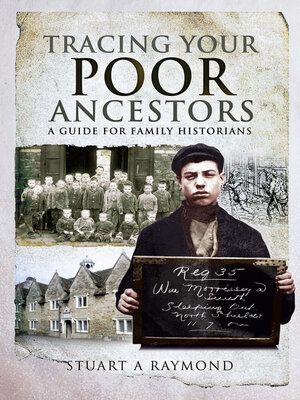Tracing Your Poor Ancestors
ebook ∣ A Guide for Family Historians · Tracing Your Ancestors
By Stuart A. Raymond

Sign up to save your library
With an OverDrive account, you can save your favorite libraries for at-a-glance information about availability. Find out more about OverDrive accounts.
Find this title in Libby, the library reading app by OverDrive.



Search for a digital library with this title
Title found at these libraries:
| Library Name | Distance |
|---|---|
| Loading... |
"Provides a wealth of information about . . . people who have gone through debt collectives, hospitals, bankruptcy, crime, homelessness—the list is huge." —UK Historian
Many people in the past—perhaps a majority—were poor. Tracing our ancestors amongst them involves consulting a wide range of sources. Stuart Raymond's handbook is the ideal guide to them.
He examines the history of the poor and how they survived. Some were supported by charity. A few were lucky enough to live in an almshouse. Many had to depend on whatever the poor law overseers gave them. Others were forced into the Union workhouse. Some turned to a life of crime. Vagrants were whipped and poor children were apprenticed by the overseers or by a charity. Paupers living in the wrong place were forcibly "removed" to their parish of settlement. Many parishes and charities offered them the chance to emigrate to North America or Australia.
As a result, there are many places where information can be found about the poor. Stuart Raymond describes them all: the records of charities, of the poor law overseers, of poor law unions, of Quarter Sessions, of bankruptcy, and of friendly societies. He suggests many other potential sources of information in record offices, libraries, and on the internet.
"Packed with incredibly useful reference information which no family historian should be without." —The Essex Family Historian
Many people in the past—perhaps a majority—were poor. Tracing our ancestors amongst them involves consulting a wide range of sources. Stuart Raymond's handbook is the ideal guide to them.
He examines the history of the poor and how they survived. Some were supported by charity. A few were lucky enough to live in an almshouse. Many had to depend on whatever the poor law overseers gave them. Others were forced into the Union workhouse. Some turned to a life of crime. Vagrants were whipped and poor children were apprenticed by the overseers or by a charity. Paupers living in the wrong place were forcibly "removed" to their parish of settlement. Many parishes and charities offered them the chance to emigrate to North America or Australia.
As a result, there are many places where information can be found about the poor. Stuart Raymond describes them all: the records of charities, of the poor law overseers, of poor law unions, of Quarter Sessions, of bankruptcy, and of friendly societies. He suggests many other potential sources of information in record offices, libraries, and on the internet.
"Packed with incredibly useful reference information which no family historian should be without." —The Essex Family Historian







